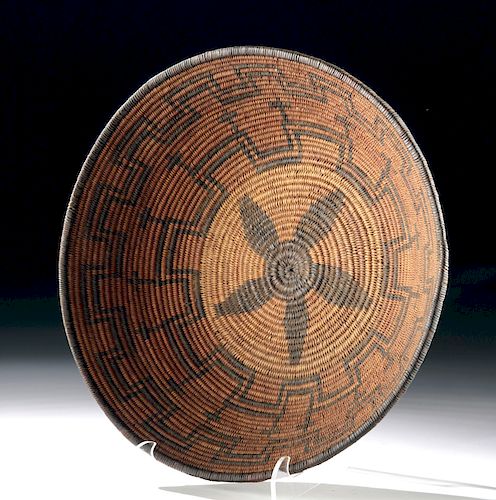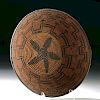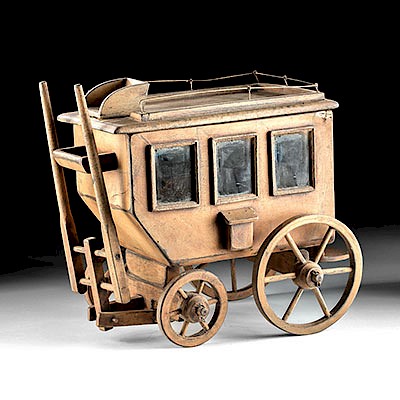19th C. Native American Apache Basket Tray, ex-Museum
Lot 104a
About Seller
Artemis Gallery
686 S Taylor Ave, Ste 106
Louisville, CO 80027
United States
Selling antiquities, ancient and ethnographic art online since 1993, Artemis Gallery specializes in Classical Antiquities (Egyptian, Greek, Roman, Near Eastern), Asian, Pre-Columbian, African / Tribal / Oceanographic art. Our extensive inventory includes pottery, stone, metal, wood, glass and textil...Read more
Estimate:
$2,500 - $3,500
Absentee vs Live bid
Two ways to bid:
- Leave a max absentee bid and the platform will bid on your behalf up to your maximum bid during the live auction.
- Bid live during the auction and your bids will be submitted real-time to the auctioneer.
Bid Increments
| Price | Bid Increment |
|---|---|
| $0 | $25 |
| $300 | $50 |
| $1,000 | $100 |
| $2,000 | $250 |
| $5,000 | $500 |
| $10,000 | $1,000 |
| $20,000 | $2,500 |
| $50,000 | $5,000 |
| $100,000 | $10,000 |
| $200,000 | $20,000 |
About Auction
By Artemis Gallery
Nov 14, 2019
Set Reminder
2019-11-14 10:00:00
2019-11-14 10:00:00
America/New_York
Bidsquare
Bidsquare : Ethnographic | Tribal | American Frontier
https://www.bidsquare.com/auctions/artemis-gallery/ethnographic-tribal-american-frontier-4634
Featuring Pre-Columbian, Tribal / Oceanic, Spanish Colonial, historical examples from the Spanish, Mexican, and American frontiers, fossils, and more. All items offered for sale have been legally acquired, are legal to sell and are guaranteed to be as described or your money back. Artemis Gallery info@artemisgallery.com
Featuring Pre-Columbian, Tribal / Oceanic, Spanish Colonial, historical examples from the Spanish, Mexican, and American frontiers, fossils, and more. All items offered for sale have been legally acquired, are legal to sell and are guaranteed to be as described or your money back. Artemis Gallery info@artemisgallery.com
- Lot Description
North America, Southwest, Papago (Tohono O'odham), ca. 19th century CE. A sizeable basket, beautifully woven from native plant fibers over a willow rod construction in accordance with tradition, and presenting a central five-petal flower motif surrounded by two bands of an angular meander motif on the side walls, with crosses atop the lower band. The red hued fibers are most likely yucca root, and the basket is beautifully laced in devil's claw. Apache trays have traditionally been created by women in flat, curved, and bowl forms like this example. Those with pictorial elements are coveted, and the coloration oxidizes over time to warm hues as we see in this example. Apache trays were originally created for winnowing grain or storing food. Size: 11.375" W x 3" H (28.9 cm x 7.6 cm)
The Apache have a longstanding basketry tradition, and basket making is among the most celebrated art forms in their culture. They have created many types of baskets, including trays, ollas, bowls and burden baskets, and have used these in virtually every aspect of daily life. Being nomadic hunters and gatherers, baskets were treasured for carrying firewood as well as roots and berries.
Provenance: private Hawaii, USA collection; ex-Willis Henry Auctions, Inc., American Indian and Ethnographic Art Auction, Sunday, May 26, 2013, Lot 69
All items legal to buy/sell under U.S. Statute covering cultural patrimony Code 2600, CHAPTER 14, and are guaranteed to be as described or your money back.
A Certificate of Authenticity will accompany all winning bids.
We ship worldwide and handle all shipping in-house for your convenience.
#150937Expected darkening to plant fibers, but otherwise excellent.Condition
- Shipping Info
-
All shipping is handled in-house for your convenience. Your invoice from Artemis Gallery will include shipping calculation instructions. If in doubt, please inquire BEFORE bidding for estimated shipping costs for individual items.
-
- Buyer's Premium



 EUR
EUR CAD
CAD AUD
AUD GBP
GBP MXN
MXN HKD
HKD CNY
CNY MYR
MYR SEK
SEK SGD
SGD CHF
CHF THB
THB














